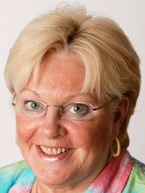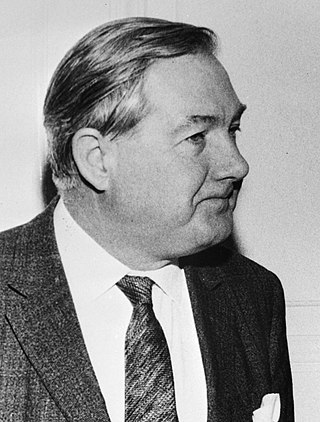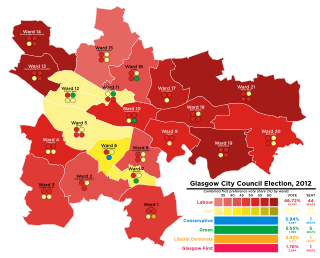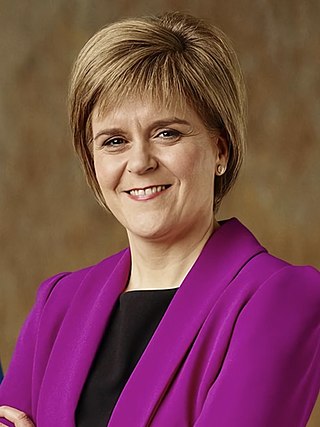Donald James Stewart was Scottish National Party (SNP) Member of Parliament (MP) from 1970 to 1987 for the Western Isles. He also served as President of the Scottish National Party (SNP) from 1982 to 1987. He was a councillor in Stornoway for many years and twice served as the town's provost.

Scottish Labour, is the part of the UK Labour Party active in Scotland. Ideologically social democratic and unionist, it holds 22 of 129 seats in the Scottish Parliament and 37 of 57 Scottish seats in the House of Commons. It is represented by 266 of the 1,226 local councillors across Scotland. The Scottish Labour party has no separate Chief Whip at Westminster.
The 1967 Hamilton by-election in Hamilton, Lanarkshire, Scotland, was held on 2 November 1967. It was called after the former Labour MP, Tom Fraser, resigned in order to take up the position as head of the North of Scotland Hydro-Electric Board. The constituency had been a safe seat for Labour, who had taken over two-thirds of the vote there in every general election from 1945 to 1966, when only the Conservatives had stood against them.

The 1973 Glasgow Govan by-election was held on 8 November 1973, following the death of John Rankin, Labour Party Member of Parliament for the Glasgow Govan constituency. Rankin had died one month earlier, on 8 October 1973. Rankin had held the seat since 1955. With the exception of a narrow Conservative victory in 1950, the seat had been solidly Labour-held since 1918. For the by-election the Labour Party nominated Harry Selby, a veteran activist in Glasgow and a former Trotskyist. It was later reported that Selby's selection had been controversial with some Labour members who felt that at the age of 61 he was too old to be starting a parliamentary career.
The 1973 Dundee East by-election, in Scotland, was held on 1 March 1973. It was one of three UK parliamentary by-elections held on that day. It was caused by the appointment of George Thomson as a European commissioner. George Machin retained the seat for Labour, but only narrowly. There was a strong showing by the Scottish National Party, which prefigured their serious breakthrough at the Govan by-election later in the year, and the two general elections of 1974.
The 1969 Glasgow Gorbals by-election was a parliamentary by-election held on 30 October 1969 for the House of Commons constituency of Glasgow Gorbals in Glasgow. It was one of five UK parliamentary by-elections held on that day.

Elections for the Scottish district councils were held in 1977.

Elections to Glasgow City Council were held on 3 May 2012, the same day as the other Scottish local government elections. The election was the second using 21 new wards created as a result of the Local Governance (Scotland) Act 2004, each ward elected three or four councillors using the single transferable vote system form of proportional representation.
Ken Guild was a Scottish National Party politician and former leader of Dundee City Council. As councillor for The Ferry ward, he led the Scottish National Party group on the Council and up until May 2017 held the position of Leader of the Council.

A general election was held in the United Kingdom on 7 May 2015 and all 59 seats in Scotland were contested under the first-past-the-post, single-member district electoral system. Unlike the 2010 general election, where no seats changed party, the Scottish National Party (SNP) won all but three seats in Scotland, gaining a total of 56 seats. The SNP received what remains the largest number of votes gained by a single political party in a United Kingdom general election in Scotland in British history, breaking the previous record set by the Labour Party in 1964 and taking the largest share of the Scottish vote in sixty years, at approximately 50 per cent.

An Election to the Edinburgh Corporation was held on 6 May 1969, alongside municipal elections across Scotland. Of the councils 69 seats, 23 were up for election.
Scottish local elections were held in 1967 to elect members to the various Corporations, Burghs, and County Boards of Scotland.
Elections for the City of Edinburgh District Council took place on 3 May 1977, alongside elections to the councils of Scotland's various other districts. These were the second election to the City of Edinburgh District Council. Conservatives won a majority with 34 of the Council's 64 seats. Across Scotland the elections saw the Conservatives and SNP make gains, while Labour lost seats. The Glasgow Herald said the Conservatives gaining control of Edinburgh District Council "crowned" what was "a night of considerable success" for the party.
Elections for the City of Glasgow District Council took place on 3 May 1977, alongside elections to the councils of Scotland's various other districts. These were the second elections to the City of Glasgow District Council, and saw Labour losing their control of the council, losing nearly half of their councillors. Among the losing councillors was Dick Dynes, the Labour group leader. Dynes was replaced as leader by Jean McFadden.
The sixth and last election to Tayside Regional Council was held on 5 May 1994 as part of the wider 1994 Scottish regional elections. The election saw the Scottish National Party overtaking Labour to become the council's largest party, and following the election the SNP formed a minority administration. The Conservatives lost 10 seats and became the third largest party. 8 weeks later, leader of the council Lena Graham resigned 'for personal reasons' and Ewan Dow took over as council leader.

The Glasgow City Council election of 2017 was held on 4 May 2017, the same day as the 31 other Scottish local government elections. The election was the first to use 23 new wards, created as a result of the Local Government Boundary Commission for Scotland's 5th Review. Each ward elected three or four councillors using the single transferable vote system, a form of proportional representation used since the 2007 election and according to the Local Governance (Scotland) Act 2004.
The 1980 City of Glasgow District Council election took place on 1 May 1980, alongside elections to the councils of Scotland's various other districts. This was the third election to the City of Glasgow District Council.

A general election was held in the United Kingdom on Thursday, 11 June 1987 and all 72 seats in Scotland were contested.

A general election was held in the United Kingdom on Thursday 3 May 1979 and all 71 seats in Scotland were contested.

Elections to Glasgow City Council took place on 5 May 2022 on the same day as the 31 other Scottish local government elections. As with other Scottish council elections, it was held using single transferable vote (STV) – a form of proportional representation – in which multiple candidates are elected in each ward and voters rank candidates in order of preference.








